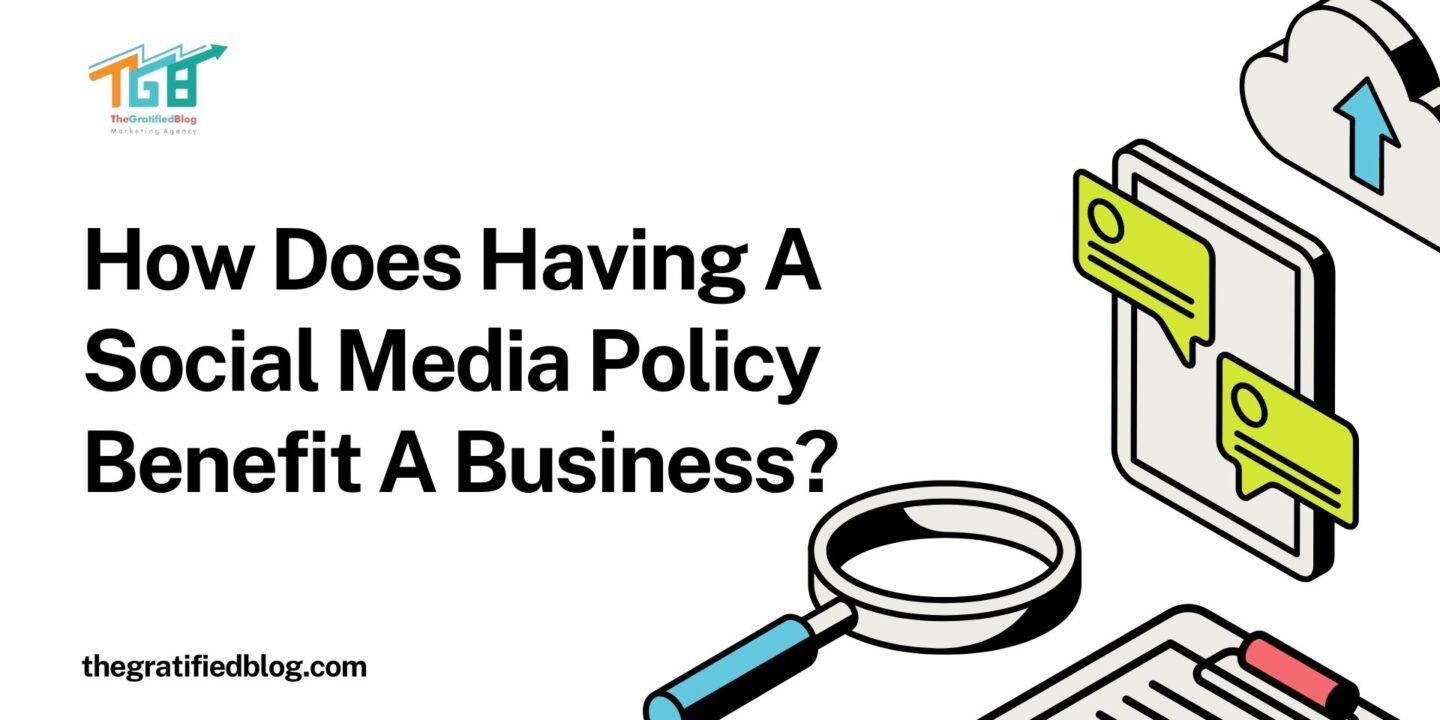
In today’s digital age, where social media platforms have become an integral part of our daily lives, it’s no surprise that businesses are increasingly leveraging these platforms to enhance their online presence, connect with customers, and promote their brands. However, with the vast opportunities and importance of social media presents, there also comes a range of risks and challenges that businesses need to navigate. This is where having a well-defined social media policy becomes crucial. In this blog post, “How does having a social media policy benefit a business?” we’ll delve into the importance of having a social media policy and how it can benefit businesses of all sizes.
Understanding Social Media Policies

Before diving into the benefits, let’s understand a social media policy. Essentially, a social media policy is a set of guidelines and rules established by a company to govern its employees’ use of social media. These policies outline acceptable behavior, content guidelines, security measures, and consequences for violating the policy.
While the specifics may vary from one organization to another, the overarching goal remains the same: to provide clarity and direction to employees on how to represent social media for business growth. Here’s a breakdown of critical components typically included in such policies:
- Purpose And Scope: Clearly define the policy’s purpose and specify which platforms it covers. Explain why adhering to these guidelines is essential for the company and its employees.
- Authorized Users: Specify who within the organization can represent the company on social media in the workplace. This could include designated social media managers or specific departments.
- Guidelines For Personal Use: Clarify whether employees can use personal social media accounts during work hours and, if so, what restrictions apply. Businesses often encourage employees to be mindful of their online presence and avoid social media posts that could negatively affect the company.
- Confidentiality And Privacy: Emphasize protecting sensitive company information and customer data. Employees should understand what information is confidential and how to handle it appropriately on social media.
- Content Guidelines: Provide specific guidance on the type of content employees can share on behalf of the company. This may include rules about language, tone, accuracy, and relevance to the brand.
- Endorsements And Disclosures: If employees promote products or services on social media, ensure they understand the guidelines for disclosing their affiliation with the company. This is particularly important in complying with regulations like the Federal Trade Commission (FTC) endorsement guidelines.
- Professionalism And Respect: Remind employees to maintain professionalism and respect for others, including customers, colleagues, competitors, and the general public. Bullying, harassment, discrimination, and offensive language should not be tolerated.
- Security Measures: Educate employees about potential social engineering threats, phishing scams, and other security risks associated with social media use. Encourage them to use strong passwords, enable two-factor authentication, and report any suspicious activity.
- Monitoring And Enforcement: Outline the company’s right to monitor social media activity related to the business and the consequences of policy violations. Depending on the severity of the breach, this could include disciplinary actions up to termination.
- Training And Education: Provide resources and training to help employees understand the policy and stay updated on best practices for using social media effectively and responsibly.
- Legal Compliance: Ensure that the policy aligns with relevant laws and regulations governing social media use, including copyright, trademark, defamation, and privacy laws.
- Updates And Revisions: Specify how the policy will be reviewed, updated, and communicated to employees to ensure its effectiveness over time.
By addressing these key areas, businesses can create comprehensive social media policies that promote responsible use of social media while protecting the company’s interests and reputation.
How Does Having A Social Media Policy Benefit A Business?
Social media has become a powerful tool for large and small businesses to connect with customers, promote their brands, and drive sales. However, with great power comes great responsibility. Businesses face various legal, reputational, and operational risks without a clear and comprehensive social media policy.
A well-crafted social media policy can help protect your business from potential pitfalls, ensure consistency in your online communications, and empower your employees to make informed decisions when using social media on behalf of your company. Having a social media policy can benefit a business in several ways:
Enhancing Brand Image And Reputation Management
One of the primary benefits of having a social media policy is its role in enhancing brand image and managing reputation. In today’s hyperconnected world, every interaction on social media can impact a company’s reputation, for better or worse.
A well-crafted social media policy ensures that employees understand how to communicate professionally and responsibly on social media, thereby mitigating the risk of damaging the company’s reputation through inappropriate or insensitive posts.
Moreover, by setting transparent content creation and sharing guidelines, businesses can ensure that their brand messaging remains consistent across all social media channels. Consistency in branding helps build brand recognition and fosters trust and credibility among customers and stakeholders.
Mitigating Legal And Compliance Risks
Social media presents many legal and compliance risks for businesses, ranging from copyright infringement and defamation to privacy violations and regulatory non-compliance. A robust social media policy can mitigate these risks by providing guidance on legal and regulatory requirements, such as copyright laws, data protection regulations, and industry-specific guidelines.
By educating employees about the legal implications of their social media activities and outlining best practices for compliance, businesses can minimize the likelihood of costly legal disputes and regulatory penalties. Furthermore, having a clear protocol for handling legal issues and crisis management ensures the company is prepared to respond effectively to social media-related emergencies.
Safeguarding Confidential Information And Intellectual Property
Another critical aspect of social media policy is safeguarding confidential information and intellectual property. With the ease of sharing content on social media, there’s a heightened risk of leaked sensitive company information or intellectual property being compromised.
A well-defined social media policy establishes guidelines for employees regarding disclosing confidential information, trade secrets, and proprietary data on social media.
Additionally, it outlines the appropriate use of company logos, trademarks, and copyrighted material to prevent unauthorized usage that could dilute the brand or infringe upon the rights of others. By raising awareness about the importance of protecting confidential information and intellectual property, businesses can reduce the likelihood of data breaches and intellectual property theft.
Promoting Employee Advocacy And Engagement
While social media policies are often perceived as restrictive measures, they can also catalyze employee advocacy and engagement. When employees feel empowered and encouraged to share content about their workplace on social media, it can amplify the company’s reach and humanize its brand.
A well-crafted social media policy should include provisions for employee advocacy programs, encouraging employees to authentically promote the company’s products, services, and values. By fostering a culture of social media advocacy, businesses can leverage the collective influence of their employees to enhance brand visibility, attract top talent, strengthen relationships with customers, and enhance customer engagement.
Improving Productivity And Maintaining Focus On Business Objectives
A well-crafted social media policy can also boost employee productivity. By clearly defining expectations and outlining the appropriate use of social media during work hours, businesses can ensure that their workforce remains focused on key business objectives.
Establishing protocols for social media usage can help minimize distractions and prevent time wastage, ultimately improving efficiency and goal attainment.
Best Practices For Developing An Effective Social Media Guidelines
Developing an effective social media policy for business involves several key considerations to ensure that it aligns with company values, protects the organization’s reputation, and fosters responsible online behavior among employees. Here are some best practices to guide you:
- Understand Legal And Regulatory Requirements: Familiarize yourself with relevant laws and regulations of social media use in your industry and jurisdiction. This may include privacy laws, intellectual property rights, and employment laws.
- Reflect Company Values: Your social media policy should reflect your organization’s values and culture. Emphasize the importance of professionalism, respect, honesty, and integrity in all online communications.
- Define Acceptable Use: Clearly outline what constitutes acceptable and unacceptable use of social media on behalf of the company. Provide examples of appropriate and inappropriate content, including but not limited to discriminatory language, confidential information, and offensive remarks.
- Specify Roles And Responsibilities: Define the roles and responsibilities of employees regarding social media use. Designate individuals or teams responsible for managing official company accounts, responding to inquiries, and monitoring online conversations.
- Protect Confidential Information: Stress the importance of protecting confidential and proprietary information. Remind employees to avoid sharing sensitive company information or discussing internal matters on public platforms.
- Respect Privacy: Remind employees to respect the privacy of others, including colleagues, customers, and business partners. Avoid sharing personal or confidential information without consent.
- Provide Training And Guidelines: Offer training sessions or resources to educate employees about the company’s social media policy and best practices for online engagement. Provide clear guidelines on how to represent the company professionally and responsibly.
- Address Personal Use: Clarify personal and professional social media use boundaries. Encourage employees to exercise discretion when discussing work-related matters on individual accounts and remind them that their online actions may reflect on the company.
- Outline Consequences For Violations: Communicate the consequences of violating the social media policy, which may include disciplinary action up to and including termination of employment. Ensure that employees understand the potential repercussions of inappropriate online behavior.
- Regularly Review And Update: Your social media policy must be periodically reviewed and updated to reflect any changes in technology, regulations, or company practices.
- Encourage Transparency And Authenticity: Encourage employees to be transparent and authentic in their online interactions. Discourage the use of fake accounts or deceptive practices that could damage trust in the company.
- Monitor And Evaluate: Implement mechanisms for monitoring and evaluating compliance with the social media policy. Monitor company accounts for adherence to guidelines and address any violations promptly.
By following these best practices, you can develop a comprehensive social media policy that promotes responsible and effective use of social media within your organization. Regularly review and update the policy to align with evolving social media trends and technologies. Consistency and transparency are key to successfully implementing a social media policy that benefits your business.
FAQs
Q1. What is the purpose of the social media policy?
Ans. The purpose of the social media policy is to provide guidelines and expectations for employees regarding their use of social media, both personally and professionally, in relation to the business.
Q2. To whom does the social media policy apply?
Ans. The policy typically applies to all employees, contractors, and anyone representing the company on social media.
Q3. What is considered acceptable behavior on social media?
Ans. Acceptable behavior usually includes being respectful, maintaining confidentiality, adhering to copyright and trademark laws, and refraining from posting offensive or discriminatory content.
Q4. Can employees use personal social media accounts at work?
Ans. It depends on the company’s policy. Some companies allow limited personal use during breaks, while others may restrict it entirely.
Q5. Are there any restrictions on what employees can post about the company?
Ans. Employees may be restricted from disclosing confidential information, commenting negatively about the company or its clients, or misrepresenting the company’s views.
Conclusion
In conclusion, having a social media policy is not just a best practice; it’s a strategic imperative for businesses operating in today’s digital landscape. The benefits of a well-defined social media policy are manifold, from protecting brand reputation and mitigating legal risks to promoting employee advocacy and engagement.
By providing employees with clear guidelines and expectations for their social media behavior, businesses can harness the power of social media while minimizing associated risks. A robust social media policy not only safeguards the company’s interests but also fosters a culture of responsible digital citizenship among employees, ensuring that social media remains a valuable asset rather than a liability for the business.








No Comments